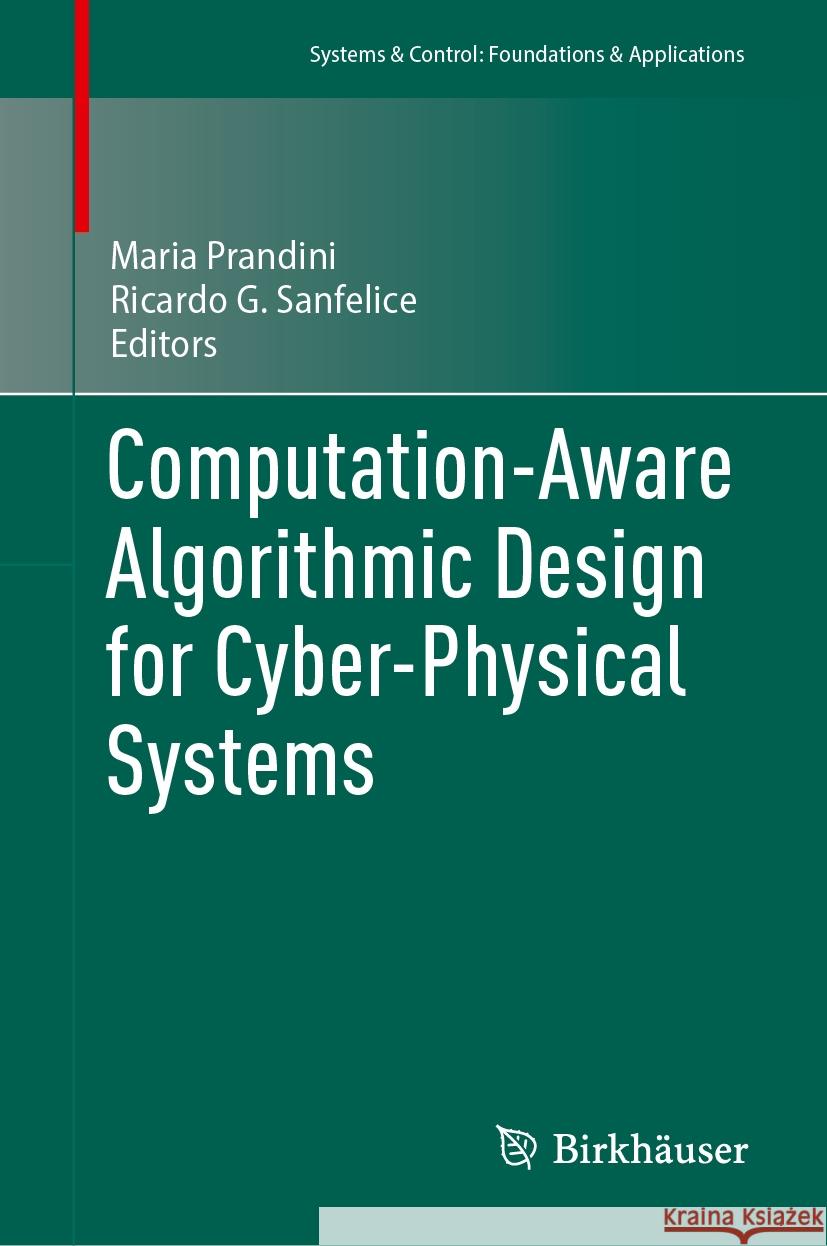Computation-Aware Algorithmic Design for Cyber-Physical Systems » książka
topmenu



Computation-Aware Algorithmic Design for Cyber-Physical Systems
ISBN-13: 9783031434471 / Angielski
Computation-Aware Algorithmic Design for Cyber-Physical Systems
ISBN-13: 9783031434471 / Angielski
cena 563,56
(netto: 536,72 VAT: 5%)
Najniższa cena z 30 dni: 501,19
(netto: 536,72 VAT: 5%)
Najniższa cena z 30 dni: 501,19
Termin realizacji zamówienia:
ok. 22 dni roboczych.
ok. 22 dni roboczych.
Darmowa dostawa!
Kategorie:
Kategorie BISAC:
Wydawca:
Birkhauser
Seria wydawnicza:
Język:
Angielski
ISBN-13:
9783031434471
Introduction (Prandini).- Models, Architectures, and Analysis for Computationally-aware CPS (Sprinkle).- Analysis and Design of Uncertain Cyber-Physical Systems (Pinto).- Handling complexity in large scale cyber-physical systems through distributed computation (Prandini).- Platoon coordination in large-scale networks: a game theoretic approach (Mårtensson).- A Linear Programming Approach for Resource-Aware Information-Theoretic Tree Abstractions (Larsson).- Information Flow in Event-Based Stabilization of Cyber-Physical Systems (Khojasteh).- Data-Driven Estimation of Forward Reachable Sets (Devonport).- Set-valued Model Predictive Control (Risso).- Automated Synthesis of Certifiable Controllers for Cyber-physical Systems: A Computation-Aware Approach (Khaled).
Maria Prandini is Professor in Control at Politecnico di Milano, Italy, where she has been Chair of the Automation and Control Engineering Program since 2019.
She has been active in the IEEE Control Systems Society (CSS), the International Federation of Automatic Control (IFAC), and the Association for Computing Machinery (ACM) and has been involved in the organization of conferences and in the editorial boards of leading journals in control. Among her activities, she was Vice-President for Conferences for IFAC (2020-23) and the IEEE CSS (2016 and 2017), and a member of ACM SIGBED Board of Directors (2019-21). Currently, she is IFAC President-elect for the triennium 2023-26, Associate Editor of the IFAC journal Automatica and of the IEEE Transactions on Control of Network Systems, and General Chair of the 2024 IEEE Conference on Decision and Control. .
In 2017, she was August-Wilhelm Scheer Visiting Professor and Honorary fellow of the TUM Institute for Advanced Studies. She is Visiting Professor in Engineering at the University of Oxford for the triennium 2022-2025. She is Distinguished Member of the IEEE Control Systems Society and Fellow of the IEEE.
Her research interests include stochastic hybrid systems, distributed and data-driven optimization, multi-agent systems, and application of control theory to transportation and energy systems.
Ricardo Sanfelice is Professor and Department Chair in Electrical and Computer Engineering at the University of California, Santa Cruz. After academic stops at UC Santa Barbara, MIT, École de Mines de Paris, and University of Arizona, he joined the Baskin School of Engineering in 2014, where he leads the Hybrid Systems Lab at UCSC.
He has published more than 290 peer-reviewed articles in journals, conferences, and book collections, in addition to the book Hybrid Dynamical Systems published by Princeton University Press, and two U.S. Patents. He is the recipient of the 2013 SIAM Control and Systems Theory Prize, the National Science Foundation CAREER award, the Air Force Young Investigator Research Award, the 2010 IEEE Control Systems Magazine Outstanding Paper Award, the 2012 STAR Higher Education Award for his contributions to STEM education, and the 2020 ACM Test-of-Time Award from the Hybrid Systems: Computation and Control Conference.
Currently Prof. Sanfelice is Director of the Cyber-Physical Systems Research Center, Director of the Center for Information Technology Research in the Interest of Society and the Banatao Institute (CITRIS) Aviation Initiative, Associate Editor for Automatica, Elsevier, and has served as Chair of the IEEE Technical Committee on Hybrid Systems. He is a Fellow of the IEEE.
This contributed volume aims to build the foundation of a framework for computationally aware algorithmic design for cyber-physical systems (CPSs), focusing on approaches that take computation into account at the design stage to address their impact on performance and safety. It demonstrates how novel techniques may emerge from the combination of formal methods, model predictive control, distributed optimization, data-driven methods, reconfigurable/adaptive methods, and information-theoretic techniques.
Chapters are written by both researchers and practitioners and cover such topics as
- analysis and design of uncertain CPSs,
- cooperative and non-cooperative paradigms for handling complexity in large scale CPSs,
- task-relevant environment abstractions for autonomous systems based on information theory,
- information flow in event-based stabilization of CPSs,
- set-valued model predictive control, and
- automated synthesis of certifiable controllers for CPSs.
State-of-the-art applications and case studies are provided throughout with a special focus on intelligent transportation systems and autonomous vehicles.
Graduate students and researchers with an interest in CPS verification and control will find this volume to be a valuable resource in their work. It will also appeal to researchers from disciplines other than control, such as computer science, operations research, applied mathematics, and robotics.
1997-2026 DolnySlask.com Agencja Internetowa
Zobacz: Księgarnia Czeska | Wydawnictwo Książkowe Klimaty | Mapa strony | Lista autorów
KrainaKsiazek.PL - Księgarnia Internetowa
KrainaKsiazek.PL - Księgarnia Internetowa









